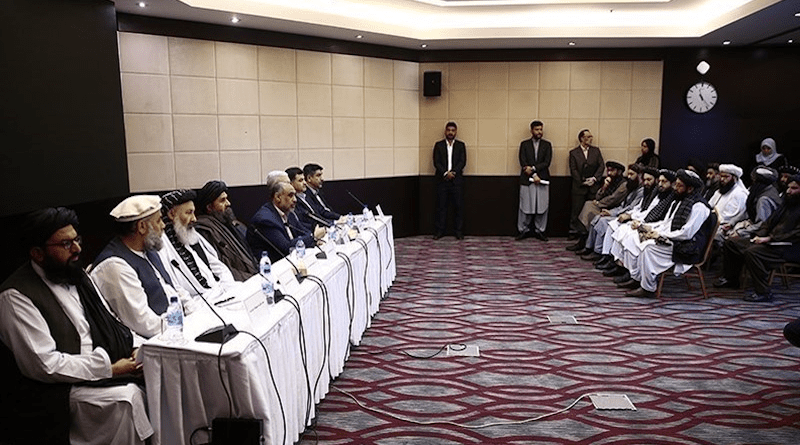The Iran-Taliban Relationship: Implications For The Afghan Peace Process – OpEd
The evolving relationship between Iran and the Taliban holds significant implications for the Afghan peace process, influencing the regional dynamics and shaping the future stability of Afghanistan. Historically, Iran and the Taliban have been adversaries due to their deep-seated ideological and sectarian differences. The Sunni Taliban and the Shia-dominated Iranian regime clashed vehemently during the Taliban’s rule in Afghanistan from 1996 to 2001, with tensions peaking after the killing of nine Iranian diplomats in Mazar-i-Sharif in 1998. However, recent geopolitical shifts and pragmatic considerations have led to a thaw in their relations, presenting both challenges and opportunities for the peace process in Afghanistan.
Iran’s strategic interests in Afghanistan are multifaceted, driven by security, political, and economic concerns. Sharing a long border with Afghanistan, Iran is directly affected by its neighbor’s stability. The spillover effects of Afghan instability, including drug trafficking, refugee flows, and cross-border militancy, pose direct threats to Iran. To mitigate these threats, Iran has increasingly engaged with various Afghan factions, including the Taliban, to influence outcomes in Afghanistan in its favor. This pragmatic approach marks a significant shift from its previous outright hostility towards the Taliban.
Over the past decade, the relationship between Iran and the Taliban has evolved, influenced by the withdrawal of U.S. forces and the changing geopolitical landscape. Iran has provided sanctuary, financial support, and military training to Taliban factions, viewing them as a counterbalance to the U.S. presence in the region and a tool to exert influence in Afghanistan. This support was part of a broader strategy to ensure that post-U.S. Afghanistan would not become a hub for anti-Iranian activities and to maintain leverage over the political landscape in Kabul.
Iran’s engagement with the Taliban also stems from its desire to counter the influence of other regional players, particularly Saudi Arabia and Pakistan. Both these countries have historically supported the Taliban, and Iran seeks to ensure that its own interests are not sidelined in a Taliban-dominated Afghanistan. By cultivating ties with the Taliban, Iran aims to secure its economic interests, including trade routes and resource access, and to protect the Shia Hazara community in Afghanistan from potential persecution by Sunni extremist groups.
The impact of the Iran-Taliban relationship on the Afghan peace process is complex and multifaceted. On one hand, Iran’s influence over the Taliban can be leveraged to push the group towards negotiations and compromise. Iran has expressed support for an inclusive political settlement in Afghanistan that accommodates all ethnic and political factions. By encouraging the Taliban to engage in dialogue and participate in a broad-based government, Iran can play a constructive role in fostering stability in Afghanistan.
However, the Iran-Taliban relationship also poses significant challenges to the peace process. Iran’s support for the Taliban could embolden the group and enable it to adopt a more intransigent stance in negotiations, complicating efforts to reach a political settlement. The Taliban’s enhanced military capabilities, bolstered by Iranian support, could lead to increased violence and instability, undermining the peace process. Additionally, Iran’s involvement in Afghanistan’s internal affairs could provoke backlash from other regional and international actors, further complicating the geopolitical landscape.
Iran’s role in the Afghan peace process is further complicated by its relations with other key stakeholders, including the Afghan government, the United States, and regional powers such as China, Russia, and India. Iran has maintained a cautious and balanced approach, engaging with the Afghan government while also building ties with the Taliban. This dual strategy aims to ensure that Iran retains influence regardless of the outcome of the peace process. However, this approach also risks alienating both the Afghan government and other international actors, who may view Iran’s support for the Taliban with suspicion.
The United States’ withdrawal from Afghanistan has created a power vacuum that regional actors, including Iran, are eager to fill. Iran’s involvement in the Afghan peace process reflects its broader regional strategy to counter U.S. influence and assert its own geopolitical ambitions. The U.S. has been critical of Iran’s support for the Taliban, viewing it as a destabilizing factor. However, any sustainable peace in Afghanistan will likely require the involvement and cooperation of all regional stakeholders, including Iran. Engaging Iran constructively in the peace process could help mitigate its support for the Taliban and align its interests with broader international efforts to stabilize Afghanistan.
The future of the Iran-Taliban relationship and its impact on the Afghan peace process will depend on several factors, including the evolving dynamics within Afghanistan, the regional geopolitical environment, and the policies of key international actors. Iran’s ability to influence the Taliban and shape outcomes in Afghanistan will hinge on its capacity to balance its strategic interests with the need for stability and peace. Similarly, the Taliban’s willingness to engage in genuine dialogue and compromise will be crucial for the success of the peace process.
In conclusion, the Iran-Taliban relationship presents both opportunities and challenges for the Afghan peace process. Iran’s engagement with the Taliban reflects its pragmatic approach to securing its strategic interests in a volatile region. While Iran’s influence over the Taliban could potentially be leveraged to encourage dialogue and foster stability, it also risks emboldening the group and complicating efforts to achieve a political settlement. A nuanced and inclusive approach that involves all regional stakeholders, including Iran, will be essential for advancing the Afghan peace process and achieving long-term stability in Afghanistan. The interplay between regional dynamics and international diplomacy will be crucial in shaping the future of Afghanistan and the broader geopolitical landscape.

